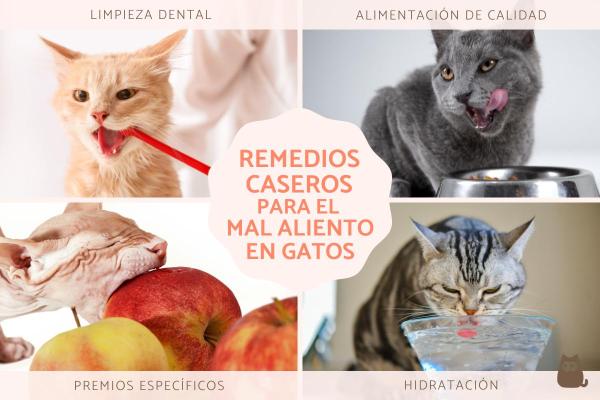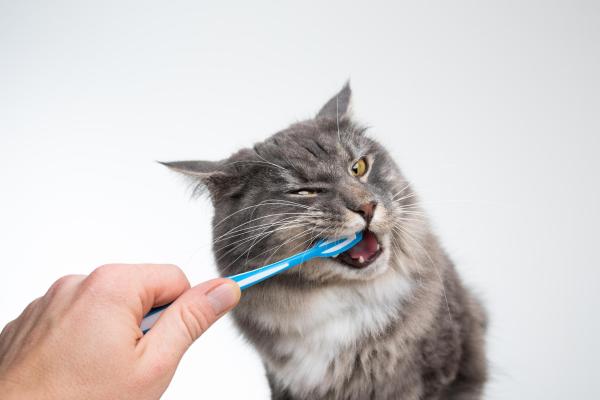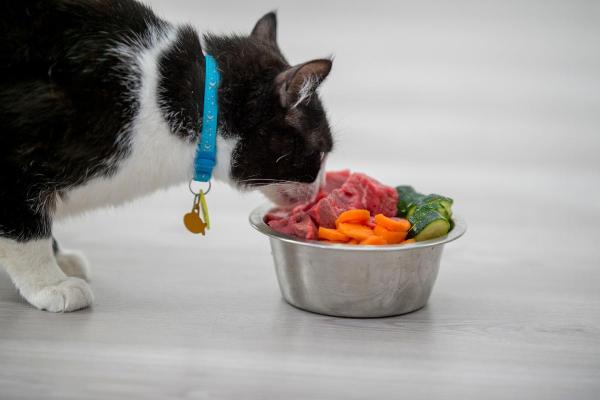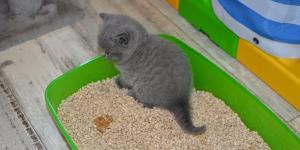Cat Bad Breath Home Remedies



See files for Cats
Also known as halitosis, bad breath in cats is a relatively common problem. Due to their diet and penchant for putting almost anything they find in their mouth, even a healthy cat can have problems with bad breath. It doesn't mean it is a problem for them, but when they come to our face for a cuddle, having their breath so close to our nose can be a bracing experience. Especially as they get older, bad breath can be an increasing problem. For this reason, we might want to know how to get rid of bad breath in cats. Better still, preventing bad breath will stop the problem developing in the first place.
If your cat has very bad breath, it could be a sign of a serious health problem. For this reason, veterinary examination is required. If you simply want to ensure your cat has fresh breath, AnimalWised provides these cat bad breath home remedies to see what we can do to make things a little more bearable.
Dental cleaning
While halitosis can be a symptom of a medical condition, it is often a case of poor oral hygiene. Too many cat guardians neglect their cat's dental health. Although their teeth should be cleaned regularly, many people neglect to do this for their cats. This is further complicated by many cats finding the experience of teeth cleaning to be uncomfortable, especially if they have not been accustomed to it from a young age.
Cleaning a cat's teeth is the best method of ensuring their oral hygiene. There are special brushes for cats which can be used, often being placed on the finger to reach in their mouth more easily. You should only use toothpaste specific for cats as those for humans can have ingredients which are toxic for felines. These toothpastes can come in different flavors which are attractive to cats and encourage their use. There are even some spray toothpastes which can be useful for very reluctant cats.
Learn more about feline dentition with our article explaining how many teeth cats have.
How often should you clean a cat's teeth?
The recommended frequency for brushing a cat's teeth is pretty much as much as you can. If you are able to brush them once a day, then this would be ideal. However, the benefit of brushing needs to be weighed against the stress which brushing might cause. For this reason, we should aim for three times per week where possible. This will better ensure their dental health, but can minimize the stress for cats who do not enjoy having their teeth brushed.
To clean a cat's teeth, you will need to start slow. Cats need to be socialized with various stimuli so they understand they are not a threat. This includes a toothbrush and toothpaste. If we are at all unsure, we can take them to a veterinarian for an assessment of the individual cat's needs and a demonstration of how to brush their teeth.
Never handle the cat roughly or scold them when trying to brush their teeth. This means they will associate dental hygiene with negative experiences and it will be even more difficult next time round. Use positive reinforcement to make positive associations. Start slow and have the help of someone else if possible. They can provide reassurance while you brush the teeth.
If the cause of halitosis is due to dental disease or damage, brushing alone will not be enough. They may have a lost tooth, bad tartar, gum inflammation or even periodontal disease. In these cases, the veterinarian will need to treat the problem to stop the cat's bad breath.
If you want to find a good toothpaste and toothbrush for your cat's teeth, you can use the link provided below:

Quality food
Cats need a diet which is adapted to their specific needs, but all cats need food which can help maintain oral health. One of the best home remedies for bad breath in cats is ensuring they have the correct food. Many products claim that their food will help clean their teeth when eating, such as a hard kibble which can be abrasive. However, this is nowhere near as useful as brushing and often the benefit to dental hygiene is minimal.
Not all cat food is the same and some cats will not even chew the kibble enough to provide any abrasive action. It can stimulate more saliva production, something which can help reduce tartar. Generally speaking, this is not sufficient to provide any real teeth-cleaning ability.
There are some feeds which are specially formulated for oral hygiene in cats. These are made to produce beneficial effects due to the ingredients they contain. These may prevent the deposit of bacterial plaque, rather than providing abrasive action.
Low-quality foods can worsen oral health by encouraging the development of tartar. It is important to choose high-quality food for your cat, for both dental and overall health. If you prefer to follow a homemade diet, it is essential to have the advice of a veterinarian specialized in nutrition to avoid nutritional deficiencies. You can then best ensure foods that combat halitosis in cats are included.
To learn more about what to feed your feline, take a look at our article asking do cats need wet food or is dry food enough?
Specific treats
Just as there are foods designed for oral hygiene, there special treats which are marketed for oral health. There are many options for sale, some of which have special flavors to make them even more appetizing for cats. You will need to choose one which is has good reviews. Unfortunately, the cat food industry is not as well regulated as food others. This means you will need to choose one which has proven effectiveness and safety.
Before giving your pet any food to stop bad breath, we should read the list of ingredients and discard those that include sugar. Sugar is a simple carbohydrate which is known to favor bacterial proliferation in the cat's teeth, something which can lead to halitosis. For this same reason, it is not advisable to offer sweets. In fact, any food for human consumption is best avoided since it may contain other ingredients which are harmful to cats.
Foods for bad breath in cats
If we do want to provide food for cats which can help with bad breath and oral hygiene, there are some human food which are better than others. These can include raw carrots and apples. These help with tartar accumulation since they are hard to chew. Although cats can eat apples, eating too much must be avoided due to the high fructose content.
If a cat eats too much sugar, it can result in diabetes. Take a look at our article on a diet for cats with diabetes to learn more.

Hydration
Cats are animals that usually drink very little water. This is related to their ancestors, who lived in desert climates and mainly obtained water from their prey. Today's domestic cats maintain the habit of drinking relatively little, but their diets have changed. Many are only fed dry kibble which has a low water content. Kibble usually contains around 8% water, whereas prey animals can be around 70% water. This is why we provide clean and fresh water for our cats in a bowl.
Some cats do not drink much from their bowl. They may need encouraged to drink water. Doing so is better to help with bad breath since hydration is vital for saliva production. To do this, we can provide water fountains around the home which have moving water to drink from. Cats prefer drinking from moving water, so it will make it more appealing to them. We can also provide wet food which has a much higher moisture content than kibble.
Fresh and clean water must be available 24 hours a day. We will need to replenish it daily, although we should do so even more when the weather is hot.
Find out why cats paw at water with our related guide.
This article is purely informative. AnimalWised does not have the authority to prescribe any veterinary treatment or create a diagnosis. We invite you to take your pet to the veterinarian if they are suffering from any condition or pain.
If you want to read similar articles to Cat Bad Breath Home Remedies, we recommend you visit our Home Remedies category.







